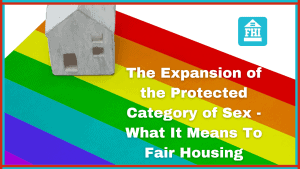The Expansion of the Protected Category of Sex – What it Means to Fair Housing

TQ+ people in housing, health care, and education. The Executive Order cites the recent Supreme Court decision, Bostock v. Clayton County, that held that the prohibition against sex discrimination in the Equal Employment Act prohibits discrimination on the basis of sexual orientation and gender identity.
The Executive Order requires the applicable federal agencies, including HUD, to review their current policies to ensure they are consistent with Bostock and the various civil rights laws. This Executive Order will result in new HUD regulations explaining the protections of LGBTQ persons under the Fair Housing Act.
In line with that, on February 11, 2021, HUD released a memo that their Office of Fair Housing and Equal Opportunity (FHEO) will fully enforce the Fair Housing Act to prohibit discrimination because of sexual orientation and gender identity. In the meantime, what does this mean for property management companies? How does this ruling impact fair housing?
Inclusive Policies and Standards
The expansion of the protected category of sex means that discrimination based on sexual orientation or gender identity is now prohibited. Housing providers need to review their policies and train their staff to avoid any appearance of bias. It is essential to ensure that policies and standards are consistent across the board, regardless of a person’s sexual orientation or gender identity.
To avoid potential discrimination scenarios, property management companies should train their staff to handle situations such as where a person’s presentation does not match their government identification, or a person is in a same-sex relationship. Conducting role-playing exercises can prepare staff to handle these situations properly and inclusively to prevent any fair housing discrimination claims.
Steps To Ensure Fair Housing Compliance
Property management companies can take several steps to be more inclusive and ensure fair housing compliance:
- Review their advertising and marketing materials: Property management companies should ensure that their advertising and marketing materials are inclusive and do not contain any discriminatory language.
- Provide equal treatment to all applicants: Property management companies should provide equal treatment to all applicants, regardless of their race, gender, religion, sexual orientation, or any other protected category. This includes following the same application and screening process for all applicants.
- Train staff on fair housing laws: Property management companies should provide regular training to their team on fair housing laws and regulations to ensure they are current on any changes and understand how to comply with them.
- Encourage diversity and inclusion: Property management companies can foster a culture of diversity and inclusion by encouraging staff to celebrate and respect differences, promoting fair housing education and awareness, and participating in community events that promote diversity.
Property management companies can create a welcoming and inclusive environment for all residents and ensure compliance with fair housing laws by taking these steps.
The Expansion of the protected Category of Sex – Understanding Is Crucial
It is crucial to be proactive and train staff now to ensure that they have the necessary understanding and tools to protect themselves and the company from any claims. As we know, testers are always out there trying to identify any possible weak points that could be construed as discrimination.
Compliance with the updated regulations will be scrutinized, so preparation is vital. By reviewing policies and conducting training, property management companies can ensure that they provide equal opportunities to all prospects, including those in the LGBTQ+ community.
Source: Fair Housing Institute















 Accessibility
Accessibility